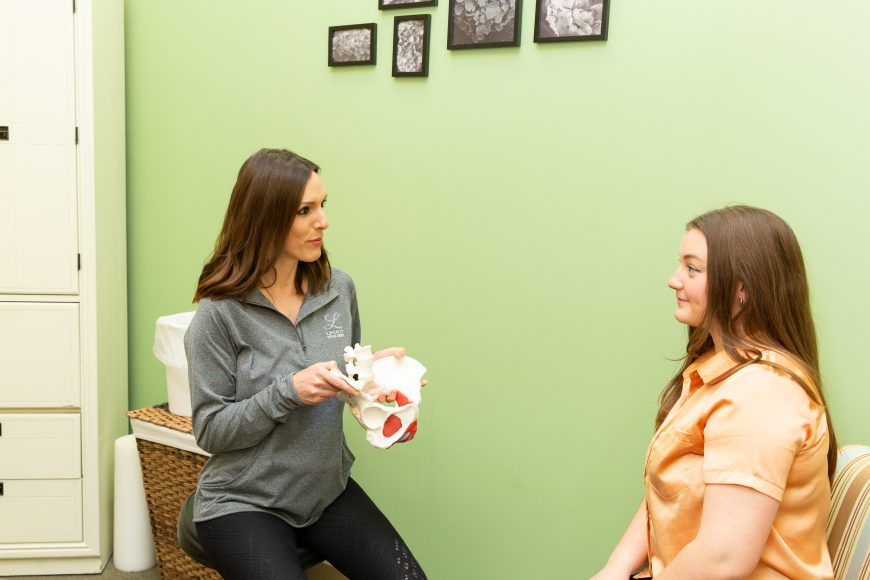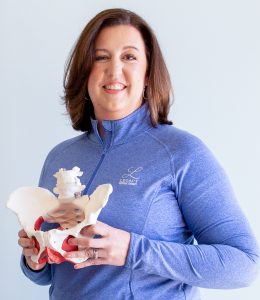Whether you are a mom-to-be, new mom, or veteran mom, you have probably heard about the bowl of muscles at the bottom of our pelvis called the pelvic floor muscles. Unfortunately, much of what you have heard may be a myth.
My name is Dr. Brooke Kalisiak. I am a pelvic physical therapist and owner of Legacy Physical Therapy, and I want to dispel some of the most common pelvic health myths.
MYTH 1: The pelvic floor muscles only help with peeing and pooping.
Truth: It is true that a key function of the pelvic floor muscles is to make sure that we don’t leak pee or poop, but this is just 1 of 5 functions of the pelvic floor.
1. Prevent bladder and bowel leakage
2. Enhance sexual arousal and orgasm
3. Support the pelvic organs (bladder, uterus, rectum)
4. Stabilize the trunk with the other core muscles (abdominals, back, and diaphragm)
5. Sump pump movement of lymphatic fluid through the pelvis
MYTH 2: Pelvic health only matters after giving birth.
Truth: While pregnancy or childbirth is certainly a major contributing factor to problems with the pelvic muscles, it is not the only cause of pelvic floor dysfunction. Day-to-day habits, postures, and activities can cause wear and tear on the pelvic floor, and other abdominal or pelvic surgeries (i.e., hysterectomies, hernia repair, prolapse repair, etc.) will impact pelvic floor function. Even if you have never given birth before, it is still important to get your pelvic health assessed for optimal function.
MYTH 3: Bladder leakage is normal after having kids.
Truth: Many moms do experience bladder leakage after having kids. However, just because it is common, does not make it normal. Many moms comment on how they leak with a cough, sneeze, or laugh or that they no longer run or jump because of bladder leakage. They wrongfully assume that the only thing they can do about it is buy the best pads/leakage underwear, take medication with side effects, or undergo a risky surgery. All of this is simply not true— moms of all ages can oftentimes overcome bladder leakage with conservative treatment options of working with a pelvic physical therapist.
MYTH 4: Pelvic health issues only affect older people.
Truth: Although age can be a factor in the development of pelvic health issues, it is not the only factor. Lifestyle choices, underlying medical conditions that weaken the muscles around the hip and core area, as well as any kind of physical trauma or surgery, can also lead to pelvic floor issues for people of all ages.
Pelvic health issues can show up at any point in life and can present with a wide variety of symptoms such as: pelvic pain, painful sex, pelvic pressure, bladder leakage, constipation, low back pain, bowel leakage, and urinary urgency/frequency. The sooner you take action on addressing these symptoms, the quicker the recovery can usually be.
MYTH 5: Pelvic floor weakness is the only type of pelvic dysfunction people can experience.
Truth: The pelvic floor muscles are skeletal muscles and are subject to the same issues that other skeletal muscles can have. The only difference is that they happen to be in an intimate area of the body close to the urethra, vagina, and anus. The pelvic floor muscles can be too weak and need to undergo strengthening. They can also be too tight, which can contribute to urinary, bowel, and sexual dysfunction and/or pelvic pain. If the pelvic floor muscles are too tight, strengthening exercises, like Kegels, are not appropriate. Other pelvic floor muscle dysfunctions include overworked/strained muscle, spasmed muscle, or overly lengthened muscle.
When you are dealing with pelvic symptoms, it is important to see a pelvic floor physical therapist to fully assess the pelvic floor function instead of just assuming that you need to do Kegel exercises. A pelvic physical therapist can help you determine what individual exercises and treatments are appropriate for your specific needs.

So, prior to reading this article, did you think some of these myths and misconceptions about pelvic health were true? You are not alone. Hopefully now you realize that pelvic health is something that every person should take note of.
If you are wondering about your pelvic health or already experiencing any pelvic health symptoms like: bladder leakage, constipation, pelvic pressure, pelvic pain, or pain with sex, reach out to reserve your free pelvic health discovery session at Legacy Physical Therapy.
 Dr. Brooke Kalisiak has over 15 years of experience as a pelvic physical therapist. She opened Legacy Physical Therapy in 2008 because she saw a need for better community access to conservative treatment options for common pelvic health conditions such as: bladder leakage, pelvic pain, pelvic organ prolapse, pregnancy pains, postpartum recovery, painful sex, bowel issues, and diastasis recti. She and her team of 4 pelvic physical therapists are committed to educating the community on pelvic health issues and what can be done about them.
Dr. Brooke Kalisiak has over 15 years of experience as a pelvic physical therapist. She opened Legacy Physical Therapy in 2008 because she saw a need for better community access to conservative treatment options for common pelvic health conditions such as: bladder leakage, pelvic pain, pelvic organ prolapse, pregnancy pains, postpartum recovery, painful sex, bowel issues, and diastasis recti. She and her team of 4 pelvic physical therapists are committed to educating the community on pelvic health issues and what can be done about them.
Legacy Physical Therapy
www.legacytherapystl.com
636-225-3649











